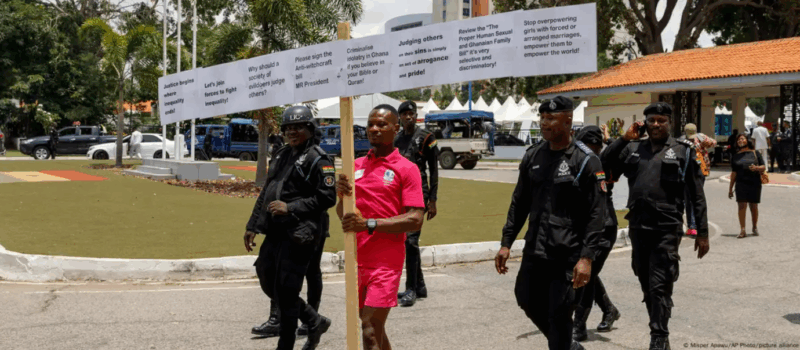Ghana’s Parliament has reignited controversy with a its anti-LGBTQ+ bill, sparking intense debate on its impact on family values and human rights.

Lawmakers in Ghana earlier this month reintroduced an anti-LGBTQ+ bill that was passed by the country’s Parliament in February 2024, but not enacted.
The legislation, known as the Human Sexual Rights and Family Values Bill, called for prison terms of up to three years for engaging in same-sex sexual relations, and up to five years for those who engage in “willful promotion, sponsorship or support of LGBTQ+ activities.”
Ghana’s Supreme Court in December rejected two legal bids to block the bill. It ruled that, as outgoing President Nana Akufo-Addo had not yet signed the bill into law, it could not be declared unconstitutional.
President John Mahama, who took office in January, said he was committed to passing the bill, which had widespread public support in Ghana but was condemned internationally for curtailing LGBTQ+ rights.
Living in fear: Ghana’s LGBTQ+ reality
Abdul-Wadud Mohammed, deputy director of LGBT Rights Ghana, told DW that he grew up in Ghana, but left his homeland because he constantly felt “under threat” there. He told DW that he knew by the age of 10 that he was gay.
“I grew up just trying to understand what I am. Everybody who knew me knew that I was gay and that has been my life,” Mohammed said, adding that he, like the majority of queer people in Ghana, faces hate and hostility from some Ghanaians due to his sexuality.
He is not alone.
“I personally witnessed someone being killed for being gay,” a bisexual man, speaking on condition of anonymity, told DW. “A traumatic event that underscored the extreme danger I face.”
He too fled Ghana for his safety.
A survey published by Afrobarometer in 2021 showed that Ghanaians are united and hospitable — but a majority are intolerant towards same-sex relationships.
Some 93% of Ghanaians questioned said they “somewhat dislike” or “strongly dislike” having people in same-sex relationships as neighbors, placing the country near the top in terms of intolerance across 23 African countries in the study.
What started the anti-LGBTQ+ discrimination?
During a radio interview in 2006, Prince Kweku McDonald, president of the Gay and Lesbians Association of Ghana (GALAG), spoke about an upcoming conference of gay and lesbian people in the Ghanaian capital, Accra, and other venues across the country.
The government said at the time that they would not allow such an event to take place — a move that drew applause from many Ghanaians.
Some human rights activists believe that it was a watershed moment for curtailing the rights of LGBTQ+ people in Ghana.
“Growing up, we could not even talk about sex between a man and a woman, much more to talk about LGBT rights … it was a disruption of what we considered the harmonious heteronormative society we had carved for ourselves,” Dr. Michael Akagbor, a senior research fellow at the Ghana Center for Democratic Development (CDD), said.
Now, almost two decades later, sponsors of the bill have said that it seeks to protect children and people who are victims of abuse.
Protecting family values or sanctioning hate?
“My position is that that bill is a critical part of our national life. Ghanaian family values, our children’s innocence must be protected,” lead proponent of the bill, Samuel George, told the Parliament Appointment Committee.
Ghana’s Speaker of Parliament, Alban Bagbin, said he is determined to see the anti-LGBTQ+ bill passed into law this year.
“It [homosexuality] is ungodly, and I will not tolerate any jokes on this matter,” he said.
However, the Ghana Center for Democratic Development (CDD), a think tank working to advance democracy, said that the conversation on family values should be put in the context of societal good rather than what the majority abhors.
“What does family value really mean? … Is corruption a family value? Is it something we should be proud of? Look at how corrupt our state actors are becoming, who is teaching them the values of corruption?” asked Michael Akagbor, the CDD’s senior programs officer.
Emmanuel Allotey, head pastor at Ghana’s Amazing Light Christian Centre said that he opposes the legislation.
“It’s a congenital issue and I don’t think anyone should be blamed for its outcomes. It’s rather unfortunate you find religious leaders show hostility on our people who are affected,” Allotey told DW. “True Christianity will tolerate our brothers and sisters affected.”
But some Ghanaians, like Abdul Mutalib Issah, a resident of Accra, think otherwise.
“If we have to leave everybody to do what they wish to do, it might cause crisis,” he told DW.
Source : https://www.dw.com/en/ghana-pushes-anti-lgbtq-bill-as-defense-of-family-values/a-72540728







